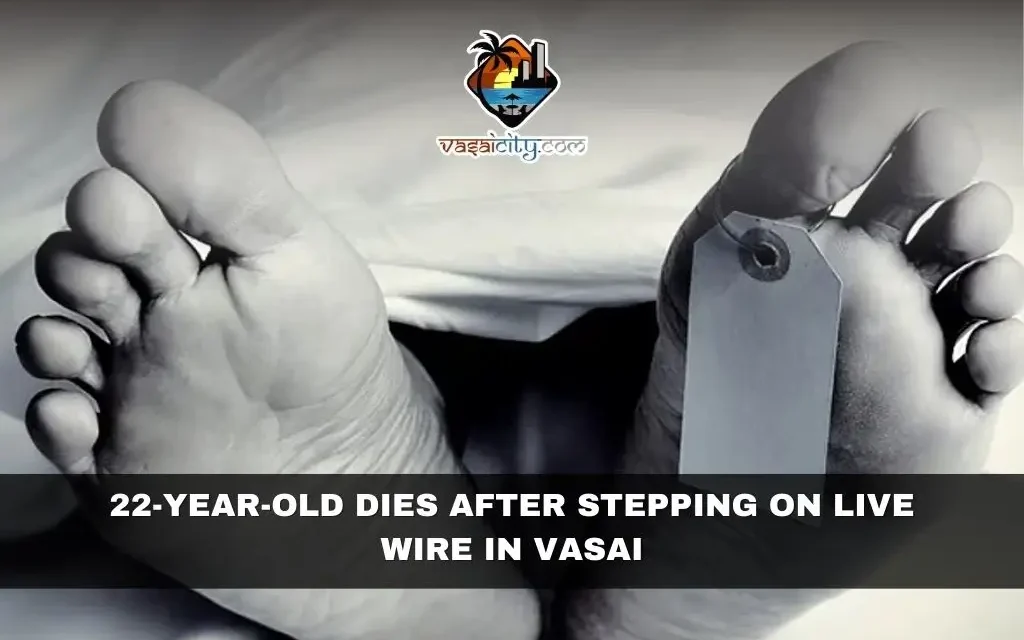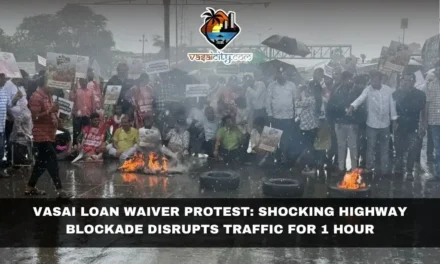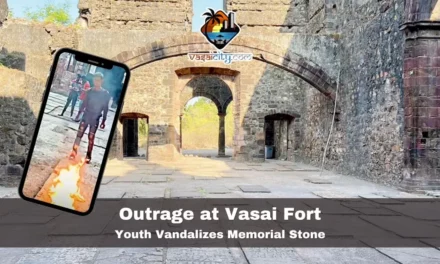A tragic incident unfolded in the early hours of Saturday morning in the Mersis area of Vasai West, where a 22-year-old man died after accidentally stepping on a live electric wire lying unnoticed in a farmland. The young man, Suraj Kumar, was reportedly collecting fodder for his cattle when he came into contact with the wire, which was still carrying a high-voltage electric current.
It was just another day for Suraj Kumar. Like most mornings, he had gone out early—around 7:30 a.m. – to gather grass and fodder for the animals. Suraj lived nearby and often walked across the same field, a familiar patch of land many locals used for grazing or for collecting natural feed. What he didn’t know was that a high-tension wire, managed by the Maharashtra State Electricity Distribution Company Limited (MSEDCL), had snapped and fallen on the ground sometime earlier. The line, despite being severed, still carried electricity and posed a deadly threat.
As Suraj bent down to collect grass, he unknowingly stepped on the wire or touched it with his hand. The powerful shock was immediate and fatal. Locals rushed to the scene, but there was nothing they could do. He was dead by the time help arrived.
The incident left the entire community in shock. Suraj was known in the neighbourhood as a hardworking young man, often helping his family with farm work and animal care. For many, his death felt personal—painful and completely avoidable.
Police and Electricity Officials Begin Investigation
As word spread, the Vasai police reached the scene quickly. They cordoned off the area and began their preliminary investigation. The body was taken for a post-mortem examination, and statements were recorded from witnesses and local residents.
Senior Police Inspector Balkrishna Ghadigaonkar, who is handling the case, confirmed that legal proceedings were underway and that the police were coordinating with electricity officials to determine what exactly went wrong. He mentioned that depending on the outcome of the post-mortem and other findings, appropriate charges could be filed.
MSEDCL officers also reached the location soon after being alerted. Their team was seen inspecting the broken wire and assessing the area. While they have not yet released an official statement, locals are demanding that the company take full responsibility.
Recurring Problem, Ignored Warnings
This is not the first time an incident like this has occurred in the Vasai-Virar region. Over the past few years, there have been multiple reports of individuals dying or being injured due to exposed or fallen electric lines. In some cases, live wires have dangled near roads, markets, and even schools, raising questions about the company’s safety practices and maintenance efforts.
Despite public complaints and repeated calls for better supervision, residents say that many broken or hanging wires are either left unattended or take days to be repaired. They argue that there is a clear lack of preventive action, which puts lives at risk every day.
With monsoon season around the corner, concerns are growing even louder. Rainwater and wet surfaces increase the danger of accidental electrocution manifold, and people fear that more such tragedies could occur unless urgent measures are taken.
“We’ve been telling them for months now,” said Ramesh Thakur, a farmer from the area. “There are wires hanging loose in multiple places. You complain to MSEDCL and they tell you someone will come. But they either come days later or don’t come at all. This poor boy died because no one fixed the wire on time.”
Voices of Anger and Grief
Suraj’s family is heartbroken. His parents, who depended on him for support, are inconsolable. Neighbours gathered around their house, offering comfort and expressing their anger.
“He was such a good boy,” said one local woman who knew Suraj. “Always smiling, always helping his family. What was his fault? Why did he have to die like this?”
Several people from the area are now planning to write a petition to local authorities, asking them to investigate the role of MSEDCL and to ensure that regular inspections are carried out. They are also asking for financial compensation for Suraj’s family, though no official announcement has been made yet.
The Larger Picture
The incident also shines a light on the larger issue of electricity safety in rural and semi-urban areas. While urban centers often have stricter enforcement of safety codes, smaller areas like Vasai still struggle with outdated infrastructure and slow response from utility providers.
Experts say that basic steps like regular inspections, faster repair response times, and visible signage around dangerous areas could prevent many such deaths. In some areas, underground cabling has been recommended, especially in zones where people work close to the ground.
“Electricity is essential, but so is human life,” said a former MSEDCL engineer on condition of anonymity. “When wires fall, they must be treated like a ticking time bomb. Quick response can save lives. If that line had been deactivated in time, Suraj might still be alive.”
What Happens Next
For now, the case is with the police, and investigations are ongoing. The community is waiting to see if anyone will be held accountable. Meanwhile, fear continues to hang over the people of Vasai, especially those who work close to nature—in fields, farms, or open areas.
Suraj Kumar’s untimely death is not just a personal tragedy. It is a wake-up call for everyone involved—from power companies to local authorities. How many more lives will be lost before action is taken?
As the people of Vasai prepare for the rainy season, their message is clear: they don’t want sympathy. They want safety. They want to live without the fear that their next step could be their last.








